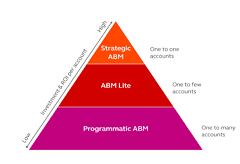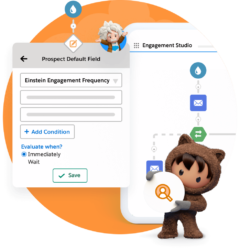For marketers worldwide, the term Account-Based Marketing (ABM) has become a familiar concept, evident in the rise of Google searches for “account-based marketing” and “ABM” in 2020. An ABM B2B model is a special case. One year later, new terms like “account-based experience,” “account-based everything,” and the encompassing acronym “ABX” are gaining traction, shifting the focus from marketing to the holistic customer journey. Therefore, account based marketing has moved from a conversion metric measurement and process to a more all encompassing one from lead capture and identification as an ABM prospect to warming and closing.
Forrester’s forward-thinking predictions indicate that by 2025, B2B demand generation will pivot towards accounts rather than leads, a trend accelerated by the events of 2020. An ABM B2B model, at its core, leverages insights about top customers to identify and engage with similar prospective customers.
True it is cheaper to maintain a customer than to win over a new one. But it is also easier to win a new customer based on what you know about an existing look-alike customer. That is the basis for all ABM.
ABM B2B Model
Implementing a robust ABM strategy requires the integration of a CRM solution and a marketing automation platform. The CRM functions as the centralized data repository, supporting the account-centric strategy, while the marketing automation platform scales and real-time engages target markets. This integration empowers B2B revenue teams to effectively launch and cultivate ABM strategies, fostering enriched customer relationships and driving business value.
Successful ABM lies in adopting an account-centric approach, placing buyers at the core of each interaction. This means crafting highly personalized experiences that seamlessly blend targeted content and intentional communications across all touchpoints. In the today’s marketplace, buyers anticipate personalized offers, and ABM is strategically designed to interpret individual buyer needs, automatically delivering pertinent content and messages across diverse channels.
Successful Account-based Marketing
Salesforce CRM serves as a linchpin for successful Account-Based Marketing. It acts as the singular source of truth for account data, providing teams with a comprehensive 360-degree view of customers. Marketing Cloud Account Engagement is especially useful for B2B ABM models. Leveraging this data, marketers can personalize engagements through marketing automation, identifying optimal ABM target accounts, creating tailored content, and delivering it through the recipient’s preferred channels. Collaboration across marketing, sales, and service teams is facilitated by sharing leads and adjusting tactics based on engagement data.
Evaluating the efficacy of your ABM campaigns is crucial for success. Metrics such as customer retention, engagement, awareness, and lead quality are instrumental in tracking and measuring your success. Organizations employing ABM see remarkable results, with 77% achieving a 10% or higher ROI, and 45% experiencing at least a two-fold ROI compared to alternative marketing strategies.
Tectonic and ABM
Tectonic, as your Salesforce implementation partner, ensures a tailored Salesforce solution aligned with your business needs. Through a proprietary discovery process, we customize a solution that encompasses essential elements of your business model while eliminating unnecessary components and technical debt.
If you are debating adding an account based marketing solution to your b2b business, contact Tectonic today.













